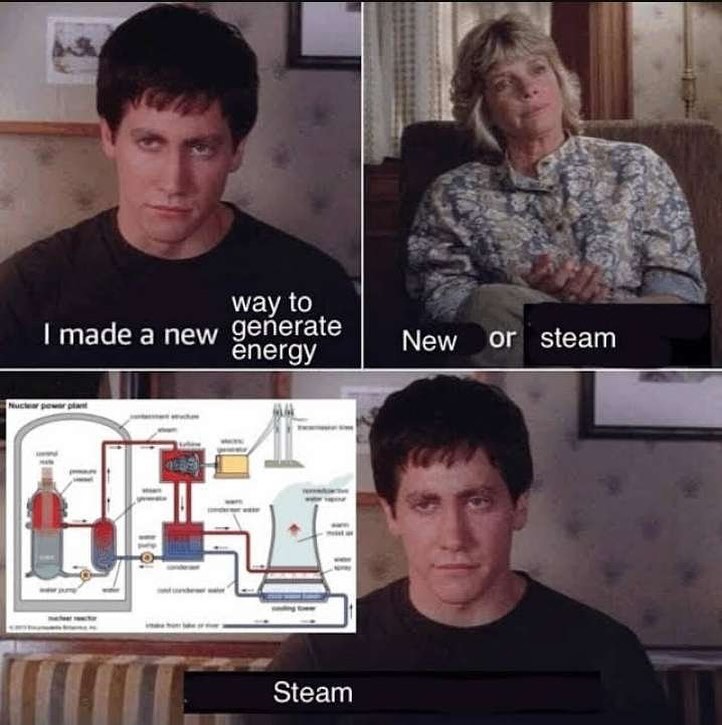this post was submitted on 09 Apr 2024
1067 points (99.1% liked)
Science Memes
12345 readers
2526 users here now
Welcome to c/science_memes @ Mander.xyz!
A place for majestic STEMLORD peacocking, as well as memes about the realities of working in a lab.

Rules
- Don't throw mud. Behave like an intellectual and remember the human.
- Keep it rooted (on topic).
- No spam.
- Infographics welcome, get schooled.
This is a science community. We use the Dawkins definition of meme.
Research Committee
Other Mander Communities
Science and Research
Biology and Life Sciences
- [email protected]
- [email protected]
- [email protected]
- [email protected]
- [email protected]
- [email protected]
- [email protected]
- [email protected]
- [email protected]
- [email protected]
- [email protected]
- [email protected]
- [email protected]
- [email protected]
- [email protected]
- [email protected]
- [email protected]
- [email protected]
- [email protected]
- [email protected]
- [email protected]
- [email protected]
- [email protected]
- [email protected]
- !reptiles and [email protected]
Physical Sciences
- [email protected]
- [email protected]
- [email protected]
- [email protected]
- [email protected]
- [email protected]
- [email protected]
- [email protected]
- [email protected]
Humanities and Social Sciences
Practical and Applied Sciences
- !exercise-and [email protected]
- [email protected]
- !self [email protected]
- [email protected]
- [email protected]
- [email protected]
Memes
Miscellaneous
founded 2 years ago
MODERATORS
you are viewing a single comment's thread
view the rest of the comments
view the rest of the comments

These numbers change every year, but: solar panels on roofs don't track so they'd be lucky to get 20%, average closer to 12%, efficiency and slowly degrade over a few years. Sun tracking panels can reach a maximum of around 40%, theoretically, but on average more like 20%-30%. You have to subtract the negative impact of creating and assembling the materials from it's lifetime effectiveness, in Germany I believe Hydrogen Steel exists which is much greener than other types of smelting, or otherwise Aluminum is the higher grade material used for such things, and Photovoltaic Panels have a very specialized Glass in most cases that has to be exceptionally clear and strong. If the capacitance of the system is not enough to hold the produced power then an electrical failure will occur, so you must also include large commercial and industrial batteries.
Meanwhile, a Heliostat (a Collection Tower and Mirror Array) out in the desert has a theoretical efficiency just below 70%. Furthermore, if the capacity of the grid fills up then the array can be disable by adjusting the mirrors and excess power can be stored for extremely long periods of time by utilizing molten salt beneath the tower.
These efficiency numbers refer to how much of the heat energy from full spectrum light hitting the array is converted into electricity. Home panels are nice because you can put them on your home
Yeah, but PV is dirt cheap nowadays. Also
If by "few" you mean like 30-50 then sure, they degrade. But it certainly beats anything with a spinning turbine. Or anything with moving parts really. PV is purely solid state physics, you can't get more longevity than that.
That's not true. You can also simply turn PV off. The inverters only run when they sense 50 Hz on their output terminals, it's easy to have them turn off when it's 50.2 instead. Basically all big powerplants follow that rule already, ordered by things like shutoff time etc.
Funny that you specified in the desert. The appeal of PV is not only that it's cheap and easy, it also scales down to small investments and local power generation. If base load actually becomes a problem concentrated solar power will be relevant. But for now, slapping a few solar panels on your roof just makes sense.
lmao your consumer grade photovoltaic panels will not last 50 years.
The solar panels I just bought have a manufacturer warranty for 87% power output after 30 years.
That's much more realistic, I like that.
My dad is still using the first 60w panel he bought in 1986, for 600$. Obvs added many more to his system, and who knows how efficient it is, but it does work, haven't put a ampmeter on it though.
Mind you it was made in the USA, probably better materials than nowadays.
The mass market has really pushed solar panel production. I expect the material quality even of the cheap china panels to be better than what anyone was able to produce almost 40 years ago. That's a long time to understand degradation processes and develop countermeasures.